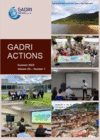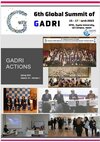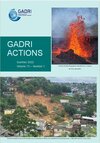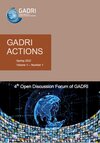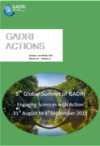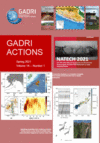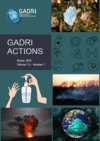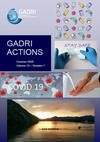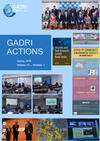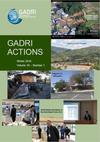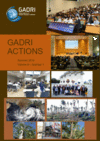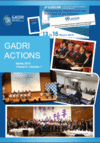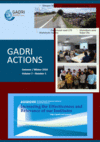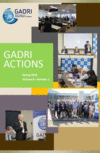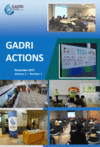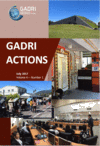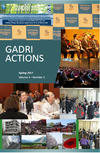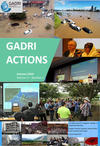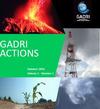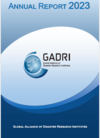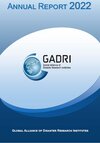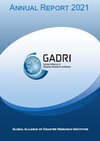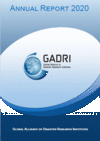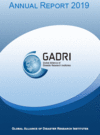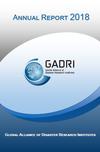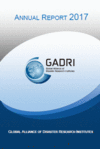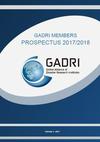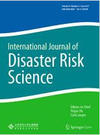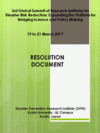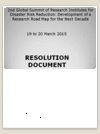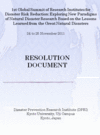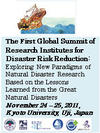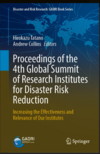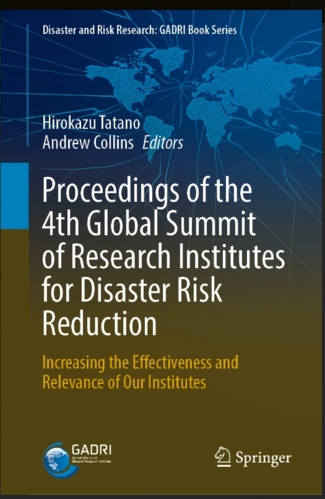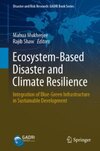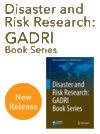Publications
GADRI Actions - Winer 2023
The GADRI newsletter - GADRI Actions 20 is published.
This issue contains a special report on raifall event in Brazil, GADRI Lecture series and the new members that joined GADRI recently. We hope you enjoy this issue of GADRI ACTIONS.
GADRI Actions - Spring 2023
GADRI Actions Volume 19 - Spring 2023 Edition is released.
An exclusive edition of the 6th Global Summit of GADRI held at the Disaster Prevention Research Institute (DPRI), Kyoto University, Uji Campus, Kyoto, Japan from 15 to 17 March 2023.
All activities related to the Summit are covered including the Poster and the Networking Sessions and the Side Event held prior to the Summit.
With regard to the Poster and the Networking Session, those who participated in the session, if you wish to receive a copy of the photo/s, do contact the GADRI Secretariat with the Poster number.
Further, we will be contacting all contributors to the 6th Global Summit of GADRI to request their inputs/full papers for the Proceedings of the 6th Global Summit of GADRI.
GADRI Actions - Winter 2022
GADRI newsletter, GADRI ACTIONS, December 2022 covers various information on activities that have taken place. This edition features a special report on Post-disaster Business Recovery Susceptibility to Financial Conditions, especially for Small and Medium Enterprises by Dr. Huan Liu, Programme-Specific Assistant Professor, DPRI, Kyoto University, Japan.
GADRI Actions 17 - Summer 2022
The newsletter of GADRI, GADRI Actions 17, shares information on research activities, forthcoming events and other useful information.
GADRI Actions 16 - Spring 2022
The Spring 2022 issue of the GADRI newsletter covers the 4th Open Discussion Forum of GADRI held on 15th March 2022. The forum specifically introduced the newly established five Committees of GADRI to implement the objectives stipulated in the Charter of GADRI.
GADRI Actions 15 - Summer to Winter 2021
GADRI Actions 15 gives an exclusive coverage of the 5th Global Summit of GADRI: Engaging Sciences wtih Action held virtually from 31st August to 1st September 2021.
GADRI Actions 14 - Spring 2021
This edition of the GADRI Actions newsletter covers various research activities of the host institute, Disaster Prevention Research Institue (DPRI), Kyoto University, and updated information on the 5th Global Summit of GADRI to be held from 31st August to 1st September 2021.
GADRI Actions 13 - Winter 2020
This edition of the GADRI newsletter covers the establishment of the South Asian Alliance of Disaster Research Institutes (SAADRI) and information on the 5th Global Summit of GADRI to be held from 31st August to 1st September 2021.
GADRI Actions 12 - Summer 2020
Summer issue of the GADRI newsletter shares information on the current global pnademic COVID-19 and other activities.
GADRI Actions 11 - Spring 2020
This issue of the GADRI actions covers GADRI activities, news and cotribution on Covid-19 from GADRI memers.
GADRI Actions 10 - Winter 2019
This issue of GADRI Actions 10 brings reports on various weather related topics and reports on various conferences and training courses shared by members of GADRI.
GADRI Actions 9 - Summer 2019
This issue of GADRI Actions 9 brings reports on various weather related topics and reports on various conferences and training courses shared by members of GADRI. The two disaster related reports on weather related disasters could also be found under disaster reports.
GADRI Actions 8 - Spring 2019
This issue covers the 4th Global Summit of Research Institutes for Disaster Risk Reduction held at the Disaster Prevention Research Institute (DPRI), Kyoto University, Uji Campus, Kyoto, Japan from 13 to 15 March 2019.
GADRI Actions 7 - Summer - Autumn 2018
This issue covers the forthcoming 4th Global Summit of Research Institutes for Disaster Risk Reduction and in particular, GADRI participation at UNISDR STAG and GRAF meetings.
GADRI Actions 6 - Spring 2018
This issue is on the Second Open Discussion Forum under the theme of "How can Disaster Research Institutes significantly contribute to real world Disaster Risk Reduction" held at the Disaster Prevention Research Institute (DPRI), Kyoto University, Uji Campus.
GADRI Actions 5 - Autumn 2017
Report on GADRI Session at the World Bosai Forum 2017 held in Sendai, Japan from 25 to 28 November 2017.
GADRI Actions 4 - Summer 2017
Report on the International Training Workshop for Natual Disaster Reduction, NCDR, Chinese Taipei; and GADRI representations in various conferences.
GADRI Actions 3 - Spring 2017
This issue covers the Third Global Summit of Research Institutes for Disaster Risk Reduction held at the Disaster Prevention Research Institute (DPRI), Kyoto University, Uji Campus, Kyoto, Japan from 19 to 21 March 2017.
GADRI Actions 2 - Autumn 2016
Featuring report on the International Training Workshop for Natual Disaster Reduction, NCDR, Chinese Taipei
GADRI Actions 1 - Summer 2016
Featuring articles on Kumamoto Earthquake and the 2016 Chinese Taipei Earthquake
GADRI Annual Report 2023
We are pleased to inform you that the GADRI Annual Report 2023 - covering the period of January to December 2023 is published. It provides a lot of information on disaster risk reduction and prevention activities, recent publications, database launches, conferences, forums, seminars and other related events.
We would like to take this opportunity to thank all 55 member institutes that took the time to share the information to complete the GADRI Annual Report 2023.
GADRI Annual Report 2022
The GADRI Annual Report 2022 is published. This time, 62 of our members shared their activity reports during the period of January to December 2022.
Our sincere thanks to all members for their contributions to complete the GADRI Annual Report 2022.
If you are participating at the 6th Global Summit of GADRI to be held from 15 to 17 March 2023 at the Disaster Prevention Research Institute, Kyoto University, Uji Campus, Kyoto, Japan, you can collect a copy of the printed version of the report.
GADRI Annual Report 2021
We are pleased to share the GADRI Annual Report 2021 covering activities carried out by our members during the period of January to December 2021.
Our sincere thanks to all members for contributing the inputs to complete the GADRI Annual Report 2021.
GADRI Annual Report 2020
We are pleased to share the GADRI Annual Report 2020 covering activities carried out by our members.
We thank all our members for contributing various information to complete the GADRI Annual Report.
GADRI Annual Report 2019
GADRI Annual Report 2019 shares activities and reports shared by our members.
We thank all our members who contributed the information to complete the GADRI Annual Report 2019.
GADRI Annual Report 2018
The 2018 activities of GADRI are highlighted in the Annual Report. We thank all our members who contributed the information.
GADRI Annual Report 2017
In 2017 GADRI actively engaged in contributing to number of milestone activities together with other stakeholders in the disaster risk reduction and management arena.
The Annual Report 2017 captures a number of these activities carried out by GADRI and its member institutes.
GADRI Prospectus 2017/2018
The GADRI Prospectus shares information on institutional focus, capacity development activities, latest publications, contact details and other useful information.
Proceedings of the 4th Global Summit of Disaster Research Institutes
The Proceedings of the 4th Global Summit of GADRI was published by Springer in Summer of 2023.
Click the link to see details.
Ecosystem-Based Disaster and Climate Resilience
The book on Ecosystem-Based Disaster and Climate Resilience: Integration of Blue-Green Infrastructure in Sustainable Development by Editors Prof. Mahua Mukherjee and Prof. Rajib Shaw was published under the Disaster and Risk Research: GADRI Book Series in 2021.
- Introduces multi-hazard risk resilience tools
- Promotes nature and natural processes for disaster resilience
- Presents global disaster resilience issues that can be resolved with local solutions
For further details, visit the links below:
Disaster and Risk Research: GADRI Book Series
GADRI is proud to announce the first publication under GADRI Book Series by Editors: Yokomatsu, Muneta, Hochrainer-Stigler, Stefan (Eds.) on Disaster Risk Reduction and Resilience.
Disaster Risk Reduction and Resilience
The first book under Disaster and Risk Research: GADRI Book Series is published!
The book on Disaster Risk Reduction and Resilience by editors Dr. Muneta Yokomatsu, and Dr. Stefan Hochrainer-Stigler was published in Jauary 2020.
The book covers:
- Focuses on disaster risk reduction from a multidisciplinary resilience perspective
- Includes discussions of how diverse topics are connected with goals identified by the Sendai Framework 2015-2030
- Addresses resilience to various natural hazards including flood, wind, earthquake, volcano, landslide, and Natech types
For further details, visit the following links:

